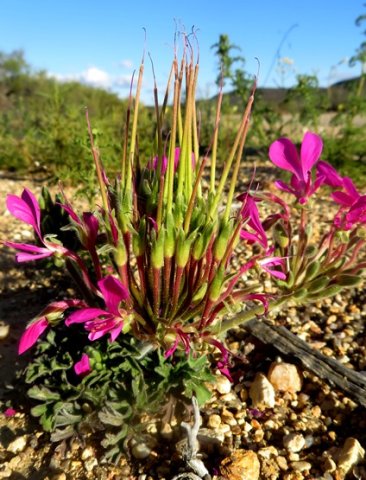Pelargonium incrassatum green fruit

Author: Ivan Lätti
Photographer: Thabo Maphisa
Pelargonium incrassatum flowers turned fruit form an erect, green cluster in picture. No longer a rounded umbel of pink to magenta flowers, the long, red-brown stalks cohere in the slightly disorganised platoon formation one expects from raw recruits. They, after all, perform this manoeuvre only once, not bashing about on a parade ground for hours and days as if life is about group inflicted discipline.
The pointed green calyces in picture have by now survived the flimsier petals, still serving a purpose as stabilising containers folded around the developing ovaries. The tall stork's-bill fruit protrusions at the top end in thread-like style remains, at least for a while. A couple of younger flower umbels in picture on the side are living through earlier stages of the standard inflorescence development sequence.
Hidden in plain sight, the whimsical variability of nature masks much unwavering discipline in the life cycles of species. The specific pattern of development is unique, endlessly repeated. Pattern-adherence is mastered by the survivors of a species and their offspring. Each pattern is the established and recognisable way of a particular species. Collectively across species this constitutes nature.
All of this and more waits out there to be discovered, cherished and respected by people. One more species in the mix of what lives on earth to be met and marvelled at. And each a relative to boot, go check the overlap in shared genes. People sometimes act responsibly in nature as self-appointed custodians, sometimes dip below standard as exploiters and destroyers. The saint and the hooligan wear the same cap. Humanity's best interests and self-professed best efforts are all parts of the slowest of learning curves on earth (Manning, 2009; Le Roux, et al, 2005; Eliovson, 1990; iNaturalist).

